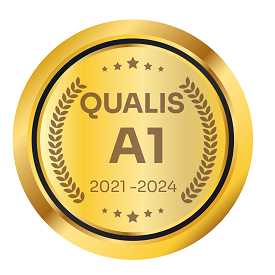Preparación de futuros directivos educativos para la actividad profesional
DOI:
https://doi.org/10.22633/rpge.v26iesp.2.16566Palabras clave:
Gerencia, Gerente educativo, Cultura gerencial, Cultura pedagógicaResumen
En este artículo, se llevaron a cabo los siguientes objetivos: análisis de la esencia, el contenido y la estructura de la cultura empresarial, identificación de las características del desarrollo de la cultura empresarial, elaboración y prueba del modelo y el programa para el desarrollo de la cultura empresarial. futuros gestores educativos. El análisis de varios aspectos de la actividad del gerente, los requisitos para el desempeño profesional y las especificidades de la cultura gerencial en el ámbito educativo permitió afirmar que la cultura gerencial es tanto una cualidad del individuo como una propiedad del ambiente gerencial de la organización. En este contexto, se observa el siguiente patrón: la cultura gerencial de la organización determina la cultura gerencial de sus empleados, y al mismo tiempo, existe una tendencia opuesta, mostrando que la cultura gerencial de un empleado individual afecta la cultura gerencial de la organización.
Descargas
Citas
ANTYUKHOV, A. V. et al. Formation of modern managerial culture of university students. Bryansk: “Cursive” Publishing House, 2009.
ARKHANGELSKY, S. I. Educational process in higher school, its natural foundations and methods. Moscow: Publishing House “Higher School”, 1980.
ARNOLDOV, A. I. Man and the world of culture: an introduction to cultural studies. Moscow: Publishing House “Izd-vo MGIK”, 1992.
BARABANSHCHIKOV, V. A. Psychology of perception. Organization and development of the perceptual process. Moscow: Publishing House “Higher School of Psychology, Cogito-Center”, 2019.
BIBLER, V. S. Culture: dialogue of cultures (experience of definition). Questions of Philosophy, n. 6, p. 122-131, 1989.
BONDAREVSKAYA, E. V. Theory and practice of personality-oriented education. Rostov-on-Don: Publishing house Rostov University, 2000.
BURNAKIN, M.N. Managerial culture of education manager in modern conditions. Problems of modern pedagogical education, v. 64, n. 3, p. 46-49, 2019a.
BURNAKIN, M. N. Functional approach to the formation of managerial culture of, the education manager. Problems of modern pedagogical education, v. 64, n. 3, p. 49-53, 2019b.
BURNAKIN, M. N. Methods of forming the managerial culture of future education managers. Professional education and society, n. 1, p. 229-237, 2021.
BURNAKIN, M. N.; MAKAROVA, V. V. Innovative Forms and Methods of Vocational Education in the Training of Economists and Managers. Problems of Modern Pedagogical Education, v. 59, n. 3, p. 130-132, 2018.
CARPENTIER, A. We searched and found ourselves. Moscow: Publishing House “Progress”, 1984.
CASSIRER, E. Experience about man: an introduction to the philosophy of human culture. New Haven, СТ, 1944.
DUKHOVA, L. I. Socio-pedagogical factors in the formation of the teacher's subculture. Kursk, 2006.
GERSHUNSKY, B. S. Philosophy of education. Moscow: Publishing House Flinta, 1998.
GESSEN, S. I. Fundamentals of Pedagogy. Introduction to applied philosophy. Moscow: Publishing House “Shkola-Press”, 1995.
ISAEV, I. F. Professional and pedagogical culture of the teacher. Moscow: Ed. center Academy, 2002.
KARAVANOVA, L. Z. H.; SERGEEVA, M. G. Managerial culture of a social work specialist. Moscow, 2020.
KHOMERIKI, O. G.; POTASHNIK, M. M.; LORNESOV, A. V. School development as an innovative process: Methodological manual for managers of educational institutions. Moscow: Publishing House “New school”, 1994.
KHUTORSKOY, A. V. Key competencies. Design technologies. National education, n. 5, p. 55-61, 2003.
KODZHASPIROVA, G. M.; KODZHASPIROV A. YU. Pedagogical Dictionary. Moscow: Publishing House Academy, 2000.
LOSEV, A. F. History of ancient aesthetics. Early Hellenism. Moscow: Publishing House AST, Rodina-Fodio, 2000.
MAKAROVA, T. P. The model for the formation of the managerial culture of students - future civil servants in education. Bulletin of the Russian International Academy of Tourism, n. 2, p. 113-118, 2016.
MEAD, M. Culture and World of Childhood: Selected Works. Moscow, Publishing House “Nauka”, 1988.
MOL, A. Sociodynamics of cultures. Moscow: Publishing House “Progress”, 1973.
MORRIS, C. W. Foundations of the theory of signs. Moscow: Raduga Publishing House, 1983.
NIETZSCHE, F. The Will to Power. Experience of reassessment of all values. Transl. from German by GERTSIK, E. et al. Moscow: Publishing House “Cultural Revolution”, 2005.
OSIPOVA, I. N. Ethics and culture of management. Moscow: Publishing House “Form”, 2009.
OSTWALD, V. F. Wheel of life. Physico-chemical foundations of life processes. Moscow: Publishing House “Book on Demand”, 2015.
PRYAZHNIKOV, N. S.; PRYAZHNIKOV, E. YU. Psychology of labor and human dignity. 5. ed. rev. and added. Moscow: Publishing House “Academy”, 2001.
RADUGIN, A. A. Philosophy: a course of lectures. Moscow: Publishing House “Vlados”, 1995.
SLASTENIN, V. A.; PODYMIVA, L. S. Pedagogy: Innovative activity. Moscow: Publishing House IChP “Publishing House Master”, 1997.
TYLOR, E. B. Primitive culture. Moscow, Publishing house of political literature, 1989.
VALITSKAYA, A. P. Culture-creative school: concept and model of the educational process. Pedagogy, n. 4, p. 12-18, 1998.
VEDENEEVA, A. N.; CHEMERSKAYA, T. G. Management culture of state and municipal employees as a condition for the effectiveness of municipal management. Modern scientific research and innovation, n. 2, 2012.
VOROVSHCHIKOV, S. G.; NOVOZHILOV M. M. Management in education. Moscow: Publishing House “GBOU DO Educational and sports center”, Moskomsport, 2012.
ZEER, E. F. Psychology of vocational education. 2. ed. rev. Moscow: Publishing House of the Moscow Psychological and Social Institute, 2003.
Publicado
Cómo citar
Número
Sección
Licencia
Derechos de autor 2022 Revista on line de Política e Gestão Educacional

Esta obra está bajo una licencia internacional Creative Commons Atribución-NoComercial-CompartirIgual 4.0.
Manuscritos aceitos e publicados são de propriedade da Revista on line de Política e Gestão Educacional. É vedada a submissão integral ou parcial do manuscrito a qualquer outro periódico. A responsabilidade do conteúdo dos artigos é exclusiva dos autores. É vedada a tradução para outro idioma sem a autorização escrita do Editor ouvida a Comissão Editorial Científica.











